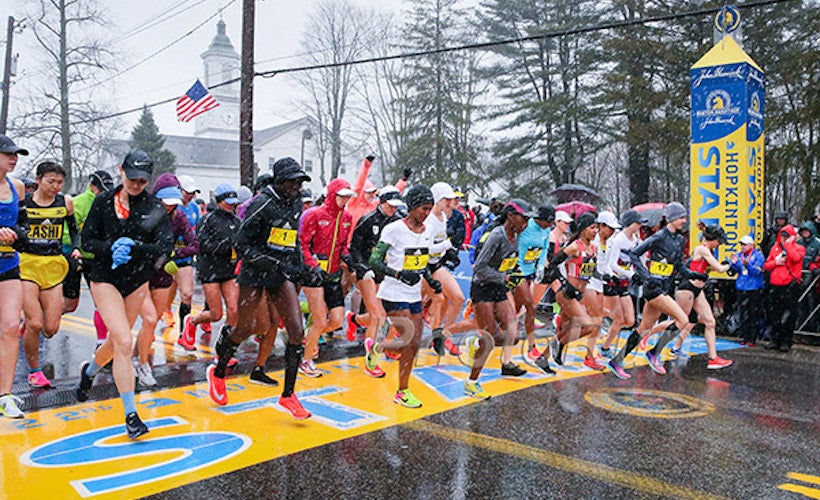After 2018 Controversy, New Rules for Boston Marathon Prize Money

The women's elite field starts the 2018 BAA Boston Marathon. April 16, 2018 Photo: KevinMorris/PhotoRun victah1111@aol.com 631-291-3409 www.photorun.net
Beginning this year, the Boston Athletic Association will accept entries to the professional women’s-only race based on a qualifying time of 2:45 for the marathon—the standard for entry into the U.S. Olympic Marathon Trials. The new policy, which will also leave some entries to the discretion of marathon officials based on age and performances at other distances, will allow as many as 70 women to compete in the pro race, up from about 60 invited athletes in previous years.
“Each year the [qualifying] cutoff varies depending on the [total] number of women entered in the Boston Marathon,” said Chris Lotsbom, B.A.A. communications manager. “Some years it’s been far under 2:45 and other years it’s been 2:46.”
And beginning in 2019, Boston’s invited professional men’s field (which will also welcome those who’ve qualified for the trials with a 2:19) will now enjoy its own start time, too, at 10 a.m., two minutes ahead the rest of the first wave of open, mixed-gender runners, who will follow at 10:02 a.m.
Only runners who are accepted into and start with the professional men’s and women’s fields will be eligible to compete for prize money. The new rules allow for more women to have a chance to run for the money, officials said.
“There are so many competitive women racing right now and we want to see them in head-to-head competition,” said Meg Reilly, B.A.A. director of communications.
The policy changes were prompted by a situation in 2018 in which three women in the open division and two masters-aged runners had faster finishing times (“chip times”) than the female athletes who ultimately took home the awards.
The women who were in the open category weren’t eligible for prize money because they weren’t included in the elite division of 44 female athletes (59 were entered, 15 didn’t start, and 18 didn’t finish), which started the marathon at 9:32 a.m. Instead, the open division women were part of the 10 a.m. wave of about 7,500 mixed-gender, age-group runners who go off at the same time as the professional men’s field.
At the Boston Marathon and other high-profile races, pro women are often given a special start of their own to provide increased media exposure and allow top female athletes to directly compete against each other.
Some runners pointed out the gender inequity, however—thousands of (non-professional) age-group men who were in the first wave were technically eligible for prize money, because they started the marathon at the same time as the elite men—an opportunity not given to the faster age-group women. The new two-minute head start for the pro men this year will eliminate that problem.
Reilly said the success of the “race-within-a-race” aspect of the early women’s start, which was launched in 2004, “encouraged us to mirror that with an elite men’s start.”
“The two-minute gap before wave one provides our elite men with a contained, elite racing opportunity,” she said.
In many ways, 2018 was an extraordinary year in Boston. When Desiree Linden became the first American woman to win the marathon in 33 years, the historical deluge of icy rain and wind left many of her competitors experiencing symptoms of hypothermia. U.S. contenders like Shalane Flanagan and Molly Huddle, for example, slowed considerably in the severe weather, which meant that three of the fastest 15 times recorded by timing chips belonged to women who started their races 28 minutes afterward.
The B.A.A. eventually matched the 2018 prize money for the women who competed in the open category. Jessica Chichester, who had the fifth-fastest time (2:45:23) received $15,000; Veronica Jackson got $1,800 for 13th pace, and Becky Snelson (2:49:50) was awarded $1,700 for 14th place. Also, Joanna Bourke Martignoni received $2,500 for third masters in 2:52:19 and Brenda Hodge won $1,000 for fifth masters in 2:58:50.
Jackson, a lawyer from New Jersey, went on to run 2:41:51 at the California International Marathon in December, where she was among 99 women who qualified for the 2020 Olympic Marathon Trials, which will be held on February 29 in Atlanta. So far, 279 women have achieved the qualifying standard.
“It was nice being in a race with all the women starting at the same time, and running in a large pack,” she said of CIM. “I would like to see that at Boston, too.”
Her wish has been granted, though it’s unlikely that so many women will ever register for the elite start in Boston at the same time.
“We don’t have 300 women who want to line up in Hopkinton this year for the early start,” Reilly said, “though that would be a nice problem to have.”